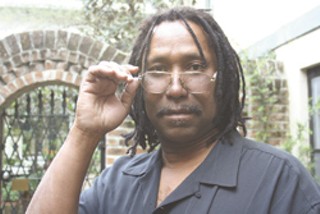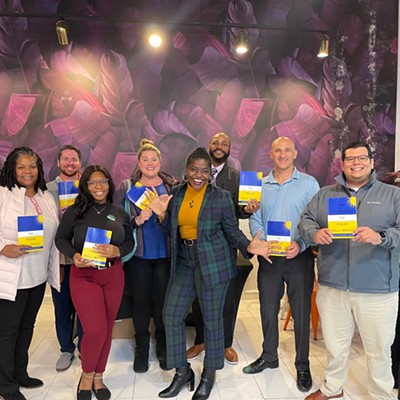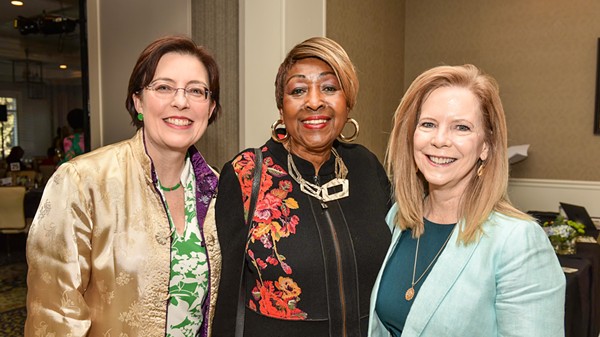The idea of a novel-writing taxi driver is something of a cliche, but in the case of Robert T. S. Mickles, it’s true.
Mickles, who owns and operates Concierge Taxi Service, has authored the young adult novel Blood Kin: A Savannah Story. His first book, at one point it was the number-four best selling fiction paperback on the March 2008 Essence magazine bestseller list.
Available locally, Blood Kin tells the story of the white Lew, member of a slaveholding family on “Woodloe” Plantation — of course a thinly disguised Wormsloe — and Robert, a black man who though technically a slave on the plantation is also Lew’s closest friend through thick and thin.
Without giving too much away, the plot centers on old family secrets, the Civil War’s aftermath, African folklore, and deep personal bonds that go beyond skin color.
Like many self-published books, Blood Kin could have used some tighter editing. For example, martial law is misspelled “marshall,” and it says General Grant gave Savannah to President Lincoln as a Christmas present, when we all know it was actually General Sherman.
That said, there’s no doubt that Blood Kin is a heartfelt, sincere work that manages to deal with longstanding Southern racial issues in a deeply human manner, without political finger-pointing or revisionist history.
And the typically insightful foreword by local author and poet Aberjhani is a particularly nice bonus.
Mickles took a break from his taxi to talk with us about the book.
Though fiction, apparently a lot of the book is based on things your family told you.
Robert Mickles: My mother was from Bermuda originally. She went to nursing school here and then moved to Washington, D.C. That’s where I lived until I was about 13, then she sent me back to Savannah to live with my dad. He grew up on the Isle of Hope Plantation. Mr. Pierpont, the gardener on the plantation, was like a grandfather to him. My father is right now the oldest living man in Pin Point. He’s 84. His name is Jordan Thomas Tremble.
Before you got back to Savannah, did you know any of your family’s local history?
Robert Mickles: I knew nothing about my father’s side of the family or any history of Savannah. In D.C. there was no segregation, everything was integrated. I went to school with whites there. And then I got to Savannah to find out it was still segregated.
I started at Johnson High, which at the time was an all-black school. So I learned about segregation, that there were certain places I couldn’t go: Johnny Harris, Daffin Park, lots of places downtown like the Lerner’s lunch counter. Life here was a whole lot different than D.C.
Sandfly was out in the country at the time. There was a man we just called “Mr. Charlie” who came down the road. We had well water, but it smelled like eggs, so we used to drink rainwater.
In returning to Savannah there was a lot of culture shock. But was there also a sense of deja vu, of feeling at home?
Robert Mickles: The kinship was immediate when I came down here. My grandmother was born in 1888, and she had stories she’d tell me. I’ve always loved stories. I worked construction in my job, so I’d sit around where people were talking, telling different stories. Growing up, I was always one to keep my mouth shut and listen. I was amazed by history.
My grandmother told me a story about her mother, who was actually a slave. One of her children got too close to a washpot and her clothes caught on fire. My great-grandmother was so afraid of the slavemaster that she was too frightened to put the fire out — on her own child! A white lady had to do it. It burned the whole side of her body. You could see her intestines through the skin.
And you know, there was no emergency room to take her to. On most plantations you’d just have someone to administer herbs or some natural remedy.
Obviously Woodloe Plantation is based on Wormsloe.
Robert Mickles: Yeah, sure, it’s Wormsloe. We didn’t know if we would get any flack for using the name in the book. We didn’t want any problems.
Is there any real-life basis to the particular story of Lew and Robert’s unusual friendship?
Robert Mickles: When my father grew up on Isle of Hope, they had a white foreman who had a son. My father and that white boy grew up together as friends. My grandfather would chastise the white boy if he had done something wrong, and also if the foreman caught my dad doing something wrong, he would let him know. On that plantation at that time, it didn’t matter if you were white or black.
I notice that the book avoids a lot of political preaching, instead just concentrating on a story about people.
Robert Mickles: We have enough negative stories out there already. I want kids to read the story and get something positive out of it, and learn something about history.
So this is directed to young adults, mostly?
Robert Mickles: It was definitely written with teenagers in mind. I have children right now, I have stepchildren. I hear a lot of children walking around saying the n-word, things like that. These kids don’t know history and they don’t know where that word originated. They think it’s badge of honor to be called the n-word. I try to give them a sense of how words came about and why we shouldn’t use that word. I want to give them a sense of what we went through as a people.
Is your success as an author changing your career as a taxi service owner?
Robert Mickles: In my taxi, I wait for people to ask me if I’m from Savannah. And I say, yes I am, and I wrote a book about it! I pretty much pitch the book to everybody who gets in my taxi.
I’m just a country boy from Sandfly. I never dreamt I’d write a book, much less have it published. I’m working on another one right now, Isaiah’s Tears. It’s a continuation of the story through Robert’s eyes, as he looks back on his life and how got from being a slave on a plantation to owning a home in D.C.
Blood Kin: A Savannah Story is available at E. Shaver Booksellers, the DeSoto Hilton gift shop, and the Ralph Mark Gilbert Civil Rights Museum.
























